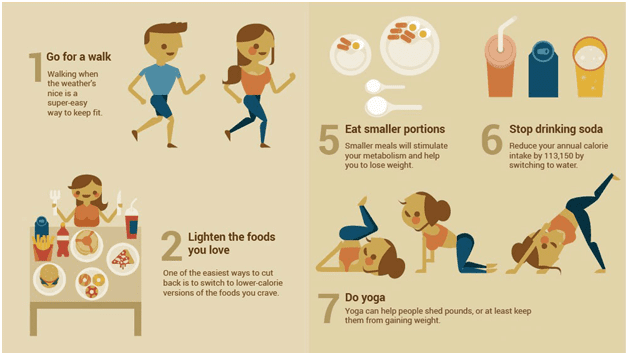
Considering that we decided to make a list of tips that will help you to realize your New Year’s resolution. Check out and set your routine!
1. Define your GoalTrying to lose weight doesn’t necessarily mean eating less. One of the biggest weight loss mistakes that we usually do is radically changing the size and the frequency of our meals. A strict diet puts your body in a stress and once you get back to your old eating habits there is a high risk that you might end up eating twice as much as used to. Solution: Start by cutting down sugars and carbs. Try to eat fruits and vegetables to provide the needed vitamins to your body. Pay attention to protein intake as it is the best source of energy for your organism.
2. Make a ListIt’s simple and it works! Make a list of To Do’s and Don’ts, visualize your goal and ensure you are following the plan. For better results, make a board with inspiring quotes, fitness/bodybuilding model photos and activities you want to get engaged in. This way you will get more into the healthy life spirit.
3. Be the Head ChefThe best way to organize your diet and keep control is to be the one who actually prepares the meals. Keep a weekly plan, include breakfast, lunch, dinner and snacks that you are allowed to eat in between your meals. Researchers claim that deciding what to eat in prior helps to control appetite and prevent one from eating unhealthy foods. Also if you are working then try to take your lunch with you and avoid eating out.
4. ExerciseA good diet is twice as effective if combine with a good exercising routine. Keeping an active lifestyle will help you feel energized and become more productive. Moreover exercising will improve your metabolism, activate digestion, boost up your mood and self-esteem and solve sleeping issues (if you have such struggles). Create a workout routine, consult a professional trainer if needed and follow the plan.
5. Drink WaterDrinking water has innumerous benefits. However what you should actually pay attention to is the fact that it help to control appetite. How? The thing is that usually dehydration sends wrong signals to our body making us feel hungry which is why usually we end up eating more than our body needs to stay energized. Another great thing about drinking lots of water is that this way you will avoid drinking any sugary beverages. What else do we need?
6. Keep a JournalLosing weight requires time and patience. One of the most common reasons of failure is that we focus on the result rather than the process. No matter how hard you try, it will take some time to see drastic changes. To keep yourself motivated and focused on the process we suggest keeping a journal. Keep a daily track of what you eat, what activities you did (even if it’s just enjoying a walk in the park) and how you felt after. Don’t be afraid to write the struggles and the moments that you even think of giving up as by expressing your emotions you will feel better. Besides, looking back on different stages you will feel proud of yourself for nor quitting even in the toughest moments. You can fit in your favorite pair of old jeans? - WRITE IT DOWN. Small achievements will keep you motivated and before you even notice it will be when you rock a fancy swimsuit.
7. Award YourselfCheatmeals are accepted even during the strictest regimes! The best time to enjoy a cheatmeal are probably the weekends as you are more relaxed and there are less chances to overeat. Choose a meal that you love (mac & cheese, hamburger or ice cream) and award yourself for making it so far.
8. Use Mobile ApplicationsWhether you need to count calorie intake or amount of water you provide to your body, one thing is sure-there is a wide range of mobile applications that you can use to make it easier to follow your weight loss plan. Moreover, if you are too lazy to head to the gym or you just don’t have that much time you can download quick workout apps and exercise indoors.
Set a goal, follow your plan and enjoy the results! Don’t forget to share your story with us!
References: ncbi.nlm.nih.gov




